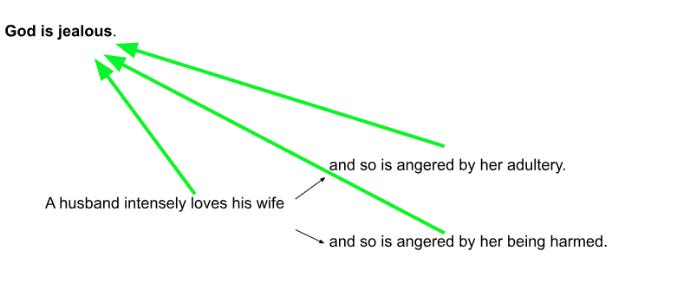The following is a quick snip from my notes for my upcoming class with Davenant, The Emotions of God. The course will be handling all the passions or emotions of God found throughout holy Scripture. If you enjoyed this post, please consider taking the course (deadline is soon!), and/or becoming a paid subscriber to support more work like this: either or both would be very much appreciated.
Quite fittingly, the first time in holy Scripture that God is said to be jealous is also the most important–Exodus 20:5: “You shall not bow down yourself to them, nor serve them; for I the Lord your God am a jealous God.” Origen, in a homily on Exodus 20, quotes verse 5 and immediately exclaims:
“Behold the kindness of God!--how, to teach us and make us perfect, he himself does not disdain the fragility of human affections. For who hears ‘the jealous God’ and does not immediately wonder and imagine the defect of human fragility? But all for us God does and suffers–and also (so we can learn) speaks, using [names from those] affections known by and customary among us. Let us see then what this is which he says: ‘I am a jealous God.’”
Although jealousy of God in holy Scripture is quite complex, we can handle its outline in five basic points.
Jealousy Involves Spiritual Adultery
First, jealousy of God only involves idolatry of the soul. Most importantly, the relationship of the soul to God is akin to the relationship of a wife to her husband; and as a consequence, the prophets (1) firmly apprehended this analogy of proportionality, and then (2) adopted the habit of usurping various names from the latter and saying them of the former. The most obvious and immediate example is them saying that the soul is a wife, and God a husband; but the prophets continued this further, doing so according to the various movements of the soul in relation to God. Thus they usurped names from our marital works: e.g., the soul leaving God they said commits adultery; and God not preventing this they said gives a bill of divorce. We are thus not surprised to find that the prophets also usurped names from the various principles of these marital works, namely our marital affection and its resultant passions. Often, all these latter were signified (equivocally) by the same conventional sign: קִנְאָה or ζῆλος.
Moreover, the prophets also used Israel’s histories to depict this story of the soul. From these histories they invented allegories, putting the relationship of the soul with God even further into material terms. Thus, not only is this soulish relationship depicted verbally, the prophets saying that God is jealous; but it is also depicted “factually” (factae; or res gestae), the prophets further saying that various happenings in Israel arose because God was jealous. This further manifests sensibly the movements of the soul in relation to God, Israel obviously playing the part of the soul. A notable example of this allegorization is Numbers 25, when the prophet says that Phinheas was “jealous with the jealousy of God” (v. 11), because he “incarnated” it materially. When Phinheas pierced with a spear the man and woman conjoined (and the woman through her womb!), this is an allegory for the so-called divine jealousy, which levels various spears and aims to destroy the union of false gods with the soul, as well as their children in its womb–even unto the third and fourth generation (Exod. 20:5), i.e., as far as they can produce or influence the soul’s conceptions.
God Is Jealous = He Did A Work of Jealousy
Second, jealousy of God often receives the standard interpretation of divine works (just like we saw with regret of God)––hence Isaiah 63:15: “Where is your jealousy and your mighty works?” Maimonides reminds us of the basics:
“We find among [God’s works] that proceed with regard to [mankind] great calamities overtaking certain individuals and destroying them, or some universal event annihilating whole tribes or even an entire region, exterminating the children and the children of the children, leaving in existence neither the products of the soil nor the offspring of living beings–for instance, submergence of land, earthquakes, destructive storms, military expeditions of one people against others in order to exterminate the latter by the sword and to efface all traces of them. Many of these [works] would proceed from one of us in reference to another only because of a violent anger or a great hatred or a desire for vengeance. With reference to these [works God] is called jealous and avenging and keeping anger and wrathful [Nah. 1:2], meaning that [works] similar to those that proceed from us from a certain aptitude of the soul–namely, jealousy, holding fast to vengeance, hatred, or anger–proceed from Him, may He be exalted, because the deserts of those who are punished, and not because of any passion whatever, may He be exalted above every deficiency.”
As Maimonides explains, many e.g., destructions happened in Israel, and in a certain mode these can be considered works of God. Accordingly, the God of such works has been said by certain prophets to be e.g., jealous, in that these works are similar to those which often arise from a jealous man. Once again, the prophet saying that God is jealous nowise reflects the intellectual judgment that he is such. This judgment is false, and the prophet rather holds that God is not jealous, and that no divine works proceed from something similar to jealousy. Still, the prophet apprehends the analogy of proportionality involving the soul, and he seized these happenings in Israel as opportunities to allegorize about e.g., the soul’s various chastenings upon its spiritual adultery. The conceptual (or “logical”) content in these sayings is only so much as this analogy, no more–or (as in cases outside holy Scripture) it be false. In colloquial terms, God being jealous in the mouth of the prophet makes no claims about God or his feelings toward us, but only about the surface of divine works being of a similar shape to the works of a jealous man.
God Is Jealous = Divine Providence
Nonetheless, third, jealousy of God also undergoes another interpretation besides divine works. This is usually spoken of as a certain divine providence or arrangement–and in fact, this can be reduced to our second main interpretation of divine passions overall: the passion was put not for some concrete work, but for some divine instrument.
Here we need to reflect carefully–both as to why this second interpretation of divine jealousy occurs, and its interlocking relationship with the first. Consider that when the soul conjoins itself to God and is moving into him, it is now akin to a wife or betrothed–we might call this its “starting position,” for our current purposes. Yet from this position, the soul can also turn and move away from God–a “middle” position, where the soul is now a wayward or adulterous wife. The soul can even rend itself entirely from God–a third and final position, where the soul is only a former wife, now divorced.
Obviously, jealousy is not said of God when the soul is in this third and final position: no man feels jealousy of his ex-wife and her various lovers, and such is the soul in its current relationship with God. But when the soul is in its starting and middle positions, it is otherwise–for in the former, the soul is discouraged from leaving by a certain providence how the union is divinely preserved; and in the latter, the soul is encouraged to return by individual works how the soul is chastised. To depict both these, the prophets usurp names from the relevant principles in a husband’s relationship to his wife–for one, his affection jealousy, how he intensely loves her and thereby does not permit adultery; and for another, his resultant passion jealousy (provoked by adultery), how he tries to right his marriage. Accordingly, the prophets have used our different jealousies to sensibly manifest the divine dealings when the soul leaves, and the divine arrangement before she does–the one to return her, the other to prevent her from ever leaving.
God Is Jealous = He Protects
Fourth, jealousy of God can have finally a third interpretation, involving different divine works than above. Consider again the marriage relationship, not when the wife violates with another, but when she is violated by such: the husband, his affection jealousy for his wife now inducing anger at her abuser, strikes him, punishing him and protecting her. Likewise, the prophets sometimes say that God is jealous, but put this for certain divine works protecting Israel and punishing another nation which has harmed her. This is much rarer in holy Scripture, but does occur.
Jealousy of God Has Different Readings
Fifth and finally, it should now be clear that in holy Scripture, jealousy of God not only has different metaphorical interpretations, but different initial readings. Recall our repeated illustration of God being a rock, which has three different readings according to the definition of rock (a rock, a mountain, a quarry); similarly, God being jealous has different (although very related) readings depending upon whence the name was usurped–whether from the initial marital affection, or its various resultant passions.
In total, we find three readings of jealousy of God. The first reading is when jealousy is usurped from a husband’s intense love not suffering a fellow in the beloved--this divine jealousy being put for a certain divine providence. The second and third readings are when jealousy is usurped from the resultant two passions which are species of anger–the one anger when the wife violates (as in e.g., Num. 5), and the other when she is violated or abused. Both these jealousies are put for certain divine works, e.g., of chastisement or punishment.
We can call these three readings: (1) preservative jealousy (intense love…); (2) the passion provoked jealousy; and finally (3) the passion protective jealousy. As expanded below, the first is primary; the second is most frequent; and the third is rare. Importantly then, most instances of jealousy of God intend jealousy as a species of anger, not e.g., as a species of sadness (jealousy as defined by e.g., Aristotle in Rhetoric II). This alerts us to the further fact that many occurrences of the Hebrew word(s) for anger in fact have the sense jealousy: many times when God is said to be angered, the reading is that he is jealous (on this, more below). Other Hebrew words are used for the jealousy which is a species of sadness–e.g., Ezekiel 6:9: “I have been broken over their whoring heart which has departed from me” (cf for similar, Hos. 11:8–9–except here, paternal sadness).
(Note on the image used, from wiki: “A miniature from the 9th-century manuscript Parisinus Graecus 923 depicting Phinehas killing Zimri and Cozbi.”)





